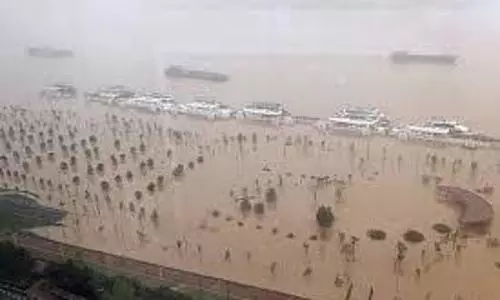
The deepening transport crisis
text_fieldsThe issue of traffic congestion of the general public who constitute the majority of Kerala's population , has reached a highly complex situation.
People young and old such as labourers, businessmen, teachers, students, government employees and patients, who are forced to travel for the purpose of livelihood, daily necessities, treatment and education, depend upon the public transport. These bus services which people rely on whether it is the Kerala State Road Transport Cooperation (KSRTC) or the private sector, have collapsed in such a way that it cannot be relied or depended on anymore. The KSRTC has been reportedly providing about 4,700- 5,000 bus services. These buses ply for 17 lakh km on a daily basis. However, those concerned make it clear that the KSRTC buses cut short one lakh kilometres daily due to the rising diesel prices - which are on a record-breaking spree - single duty/tax reform and several other factors. The cut-down has affected the ordinary services more, particularly in south Kerala where there are more nationalized routes. As per the reports, 1,000-1,200 routes have been seriously affected. The bus routes which were earlier cancelled owing to being non-profitable, are also included. It is the transport facilities in the interiors which are being totally hit due to this.
Experience proves as unfounded the notion that the decline and inadequacy of KSRTC in the public sector would strengthen the private sector and that it would make up for the shortage in the private bus services. The private buses that numbered 26,000 spiraled down to 16,000 in 2017. During the current year, only 14,500 private buses are plying. The organisation of bus owners reveal that buses are being withdrawn from the roads at the rate of three per day. All this do not happen due to the shortage of employees. If the number of cars registered in Kerala in 2017 was 2.15 lakh, it was 1.89 lakh the previous year. However, this does not aid in the travel facilities of the common man. The number of two-wheelers was 6.05 lakh in 2016 while it increased by a lakh in 2017, which has helped popular transport to a small extent. But according to 2011 census, it was the bus and train service chains in Kerala that fulfilled the travel requirements of 31.3 per cent of the employment force in the industrial and service sectors in the state. This is more than double the national average. The national average was only 14.9 per cent.
The stark realities of daily life are beyond numbers. Due to the shortage of loco pilots, 10 passenger trains were cancelled in Kerala in September. This caused severe hardship to the employees and the general public in the broad sector starting from Guruvayoor to Punalur. The bad phase that has afflicted the train services in the state is still continuing. The bus service which has been relied on by the people as an alternative, is also putting them in misery due to cancellations and cut-down of schedules. The complaint of the bus owners that the diesel prices which go up virtually every hour are much higher than what they could afford, is sure to end soon in protests and strikes for an increase in fares.
Owners say that the fare hike that came into effect in March 2018 is not enough to solve even a fraction of the problem. As for KSRTC, its employees have already declared moving to a strike from 2nd October raising several demands. When the economy of the state, which is badly damaged by the floods, is also taken into account, it has to be feared that public life is in for a dark phase. Even as the thoughts of the government regarding rebuilding of Kerala remain in place and essential, unless a solution is found for the big tragedies of daily life, the situation will get out of control. Then no rebuilding plans can be launched. The first among the issues craving for solution is that of transport. It is when 11,000 kilometers of road are fully or partially destroyed that the existing transport facilities are also disappearing. Even if we concede that we have to bear with the consequences of disasters beyond our control to a certain extent, unless vigilant action is taken to rectify man-made failings and errors, the mutual spat between the ruling front and the opposition is not going to produce any benefit. And the people are bound to get agitated.























